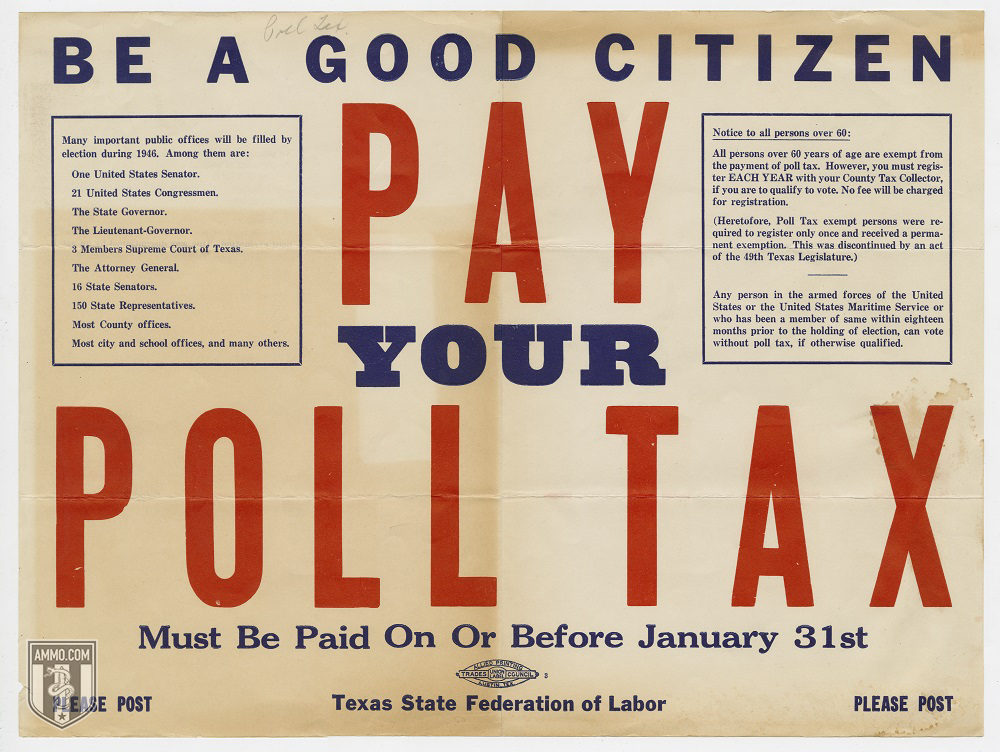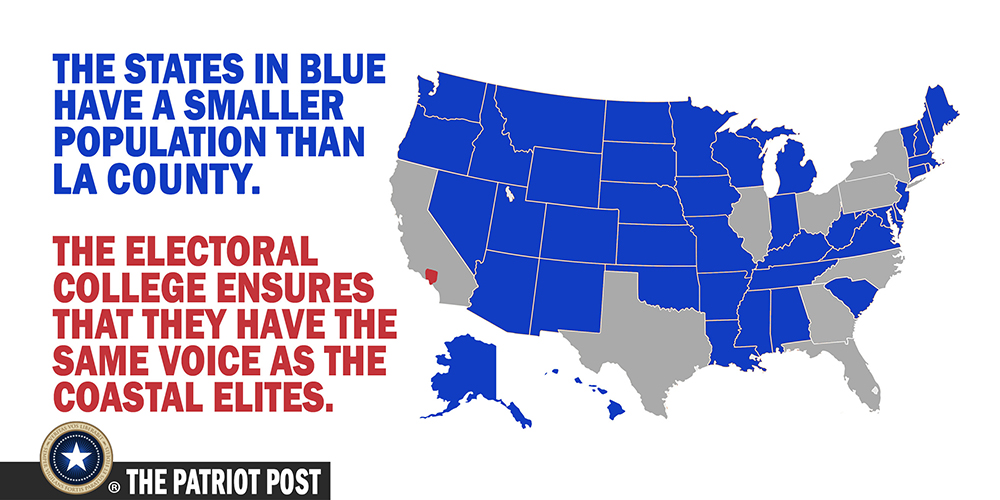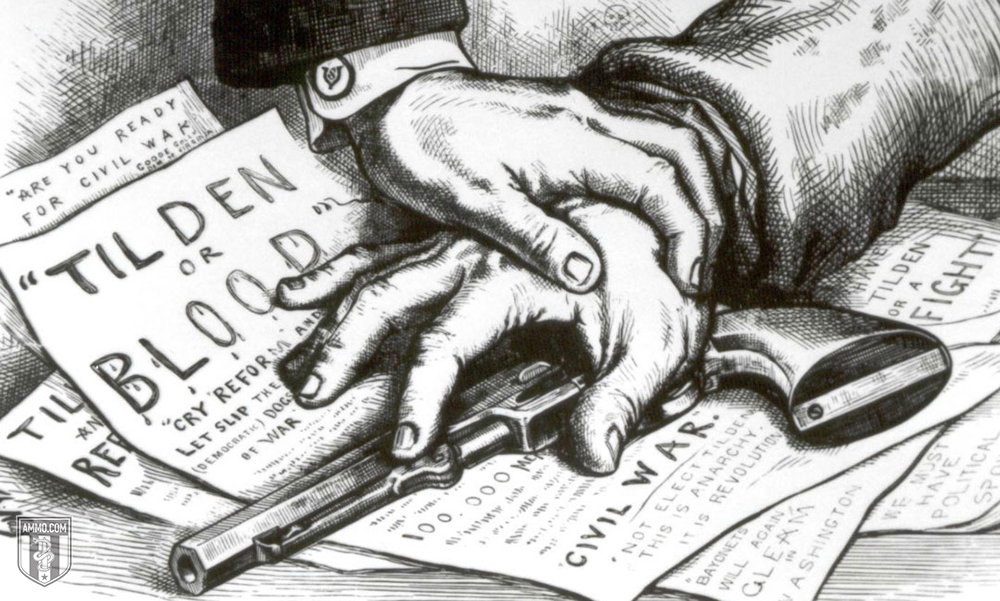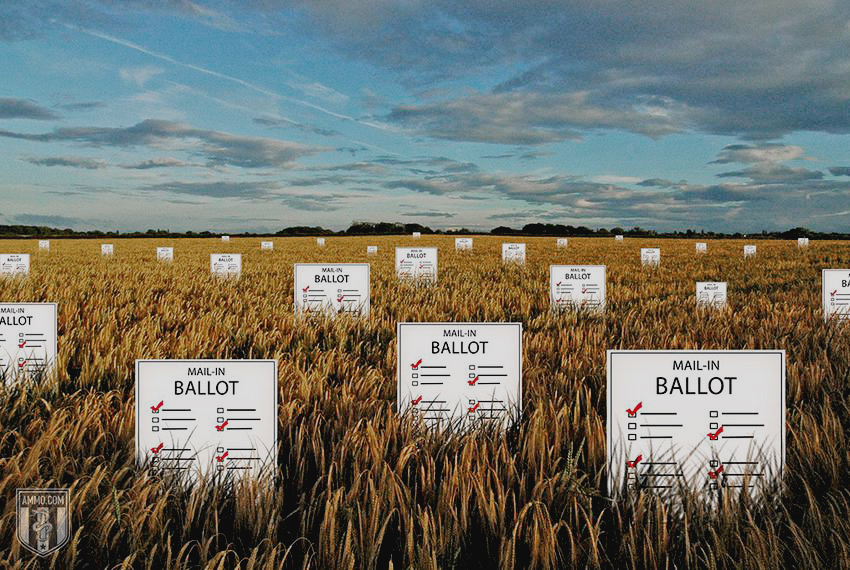Constitutional Republic vs. Pure Democracy: How the U.S. Election Process Has Changed
You're free to republish or share any of our articles (either in part or in full), which are licensed under a Creative Commons Attribution 4.0 International License. Our only requirement is that you give Ammo.com appropriate credit by linking to the original article. Spread the word; knowledge is power!
“I pledge allegiance to the Flag of the United States and to the Republic for which it stands, one Nation under God, indivisible, with liberty and justice for all.”
Conservatives are generally quick to point out that America is a republic, not a democracy. But what really is the difference, and are they even right?
Voting in America has changed considerably since the days of our founding. Back then, the government didn’t even print official ballots. Instead, you got ballots from the candidate who wanted your support. Sometimes voting took place in public, so everyone knew who you voted for. And, of course, the franchise was largely restricted to white, male property owners.
Now, anyone who turns 18 can vote. And the Democratic Party wants to increase ballot access by automatically registering anyone who gets a driver's license. Democrats even pushed for mail-in ballots for the 2020 election to make voting even easier – and more open to voter fraud. But is any of this a good thing?
Indeed, it is worth considering the transformation of the United States from a Constitutional Republic, ruled by law with the input of the people, to a total democracy, where the will of the people dominates all other discussion.
A Brief History of the Franchise in America
 Open up your pocket Constitution and find the part where it says who can vote and who can’t. You’ll come up short. That’s because the Constitution delegates this right to the states. And while there are some amendments that, for example, say states can’t restrict the franchise on the basis of race, gender or being over the age of 18, otherwise there is broad leeway given in terms of who can vote and who can’t.
Open up your pocket Constitution and find the part where it says who can vote and who can’t. You’ll come up short. That’s because the Constitution delegates this right to the states. And while there are some amendments that, for example, say states can’t restrict the franchise on the basis of race, gender or being over the age of 18, otherwise there is broad leeway given in terms of who can vote and who can’t.
Before the United States existed, people were still voting and there were oftentimes even more restrictions in place. Property qualifications were most common, but there was often also a religious test involved. For example, Plymouth Colony required that voters be “orthodox in the fundamentals of religion,” which would have likely excluded even Catholics from voting. Indeed, Catholics, Quakers and Baptists were frequently forbidden from voting in early colonial elections. (Jews were forbidden from state office in Maryland until 1828, because of a state law requiring affirmation of belief in an afterlife.)
One of the first laws drafted by the new nation was a process for people to become citizens and thus be able to vote in places where citizenship was a requirement to do so – and indeed, citizenship was not a requirement in many states or colonies in the early days of America. While only “natural born” citizens can become president, naturalized citizens enjoy the full benefits of the franchise. There is still much debate as to what qualifies as a “natural born” citizen, and it’s worth noting that several recent major party presidential candidates were not born in the United States – most recently Tulsi Gabbard (who was born in American Samoa) and Ted Cruz (who was born in Canada). The Republican nominee in 2008, John McCain, was born in the Panama Canal Zone. The last of these was the most problematic, as Downes v. Bidwell ruled that unincorporated territories were explicitly not the United States.
While it is easy to ascribe this to petty religious bigotry, the reason is actually somewhat more profound: The colonists and the colonial governments that they formed considered it important to only allow the franchise to people who shared their values. Thus, those with heterodox religious beliefs were not allowed to vote on the grounds that doing so would undermine both the values and the liberty of the colony.
Similarly, property holders were meant to be the main voters for the simple reason of having skin in the game. The early colonists did not want, for example, the merchant class to have an outsized say in politics because they were not tied to the land and thus not as subject to bad decisions. A shopkeeper or importer can simply sell their stock and move on to the next colony. A freeholder, working the land with his family, has far less flexibility and, the theory goes anyway, would be making more long-term decisions about what is best for the polity.
What this meant, also, is that, in places like New Jersey, women were allowed to vote until 1807, provided that they could meet the property requirement. What changed in the early 19th century, under the expansion of the franchise under Jacksonian Democracy, was that race and gender were prized more than property rights. But free blacks still had the right to vote in some Northern states until 1838.
This too was not an arbitrary distinction. Men who had been veterans of the War of 1812, or at the very least, defended their community against Indian raids, believed that they were entitled to the franchise on the basis of that service. By 1856, free white men were allowed to vote without meeting any property requirements, but five of the states still kept tax requirements (frequently a poll tax) in place. Again, this makes sense: The force of government is largely about the spending of taxes and the use of the military.
By 1856, all property requirements had been lifted, but tax requirements remained in place in Rhode Island and Pennsylvania, until the 20th century. Rhode Island had what was basically a brief, low-level civil war over the question of property requirements known as the Dorr War. Indeed, anytime that post-Civil War disenfranchisement is discussed, it must include a discussion of the disenfranchisement of poor whites as well. The Battle of Athens is a fascinating tale of World War II veterans returning from battle and refusing to be shafted at the ballot box anymore.
Of the 15 Constitutional Amendments passed since the Civil War, four involve the franchise. The 15th Amendment bars states from restricting the franchise on the basis of race, the 19th from restrictions on the basis of gender, the 24th bars any tax requirements, and the 26th bars any age restrictions against those over the age of 18. Another Amendment, the 17th, allows for the direct election of senators, rather than having them elected by the respective state legislature – another expansion of pure democracy in America, though not an expansion of suffrage per se.
The previous method of electing senators, having them appointed by the respective state legislatures, was not an oversight on the part of the Founders. Rather, this was to give a voice to the state governments in the federal government. This was seen as an important safeguard against the overreach of federal power. Among other things, the Senate was a check on a power-hungry federal government seeking to put its tentacles into anything it could. It was a form of distributed power that was yet another attempt by the Founders to prevent consolidation and centralization of government.
It’s worth noting that Western states, starting with Wyoming in 1869, were granting women the right to vote, largely as an enticement to get them to move to the region, which was seriously devoid of women.
The concept of “one man, one vote” is the cornerstone of a more pure democracy. There were three decisions of the Earl Warren Supreme Court that definitively transformed the landscape of America into a democracy:
- Baker v. Carr found that federal courts had jurisdiction over state redistricting efforts.
- Wesberry v. Sanders found that U.S. House of Representatives districts – whose borders are determined by state governments – must be roughly equal in population.
- Reynolds v. Sims found that state legislature districts must be roughly equal in population, regardless of chamber. This effectively means that states are not allowed to have institutions like the Senate – for example, a state government cannot give each county two seats in the state legislature if the counties do not have roughly the same population size.
Residency requirements are mostly illegal in the United States, with one-year requirements struck down in Dunn v. Blumstein. The longest residency requirement that states are allowed to have now is 50 days.
What’s So Wrong With Democracy?
 All of this raises the question of what is wrong with democracy, as opposed to a Constitutional Republic? It’s a cliche that democracy is the right of 51 percent of the population to take away the toothbrushes of the other 49. The Constitution provides protections against the tyranny of the majority and one of those protections is against pure democracy.
All of this raises the question of what is wrong with democracy, as opposed to a Constitutional Republic? It’s a cliche that democracy is the right of 51 percent of the population to take away the toothbrushes of the other 49. The Constitution provides protections against the tyranny of the majority and one of those protections is against pure democracy.
Indeed, the Senate and Electoral College, two of the last vestiges of the anti-democratic mood that penetrated the country during Revolutionary times, provide protections to rural states to this day. Without either of these, or with a Senate converted into a proportional representation body, as some have suggested, rural states are effectively political serfs for the larger urban centers.
The counter argument presented to this is that “land doesn’t vote,” which is fair enough, but again: America was not conceived as a pure democracy where everyone had an equal say in everything. There are many layers to the onion, many tiers that prevent one group of the population from having too much say over the others. The Electoral College and the Senate allow rural states to have a voice in how the country is run, rather than being totally ruled over by people in urban centers who don’t own guns, can’t grow food, and have never met their neighbors.
It’s not a coincidence that Electoral College abolition is a particular ax ground by the left. The abolition of the Electoral College would allow for sweeping changes in American public policy championed by those currently on the leftward edge of the political spectrum. Do you want to live in a country where, for example, the voters of smaller states like Nevada, New Hampshire and Montana are drowned out by a handful of cities on the coasts? What of medium-sized states with a number of post-industrial cities with their own concerns, just as valid as those of rural America, but entirely separate from the centers of financial, cultural and academic power?
There’s also the small matter of the role that the media plays in shaping public opinion, as well as the role that public works projects and other government spending play in essentially buying votes. Ostensibly “undemocratic” institutions act as brakes on the manipulation of public opinion. Indeed, the Senate was specifically designed as a deliberative body that would “cool the passions” of the masses represented in the lower house, the House of Representatives.
The Primary System as a Laboratory of Democracy
The primary process for nominating presidential candidates represents an excellent example of how pure democracy has produced poorer results than a more managed and directed one.
Most Americans, particularly younger ones, don’t know that prior to the 1970s, the primary contests didn’t mean much. Rather, it was the state party conventions which held greater weight and these were largely managed by party bosses rather than directly influenced by voters. It’s not that this system of backroom wheeling and dealing never produced a total dud or stifled genuine needs for reform – of course it did. However, looking at the roster of candidates produced by this process (i.e., two Roosevelts, a Coolidge, an Eisenhower and a Kennedy), it’s hard to argue with the results.
What was entirely lacking was the current primary process that we have in the United States, which still boasts a very low overall turnout and lasts from approximately the fourth quarter of the year before the election sometimes all the way up until the convention. All told, the Democratic Primary cycle of 2020 had 12 debates planned, with 11 completed and the 12th not happening simply because Joe Biden said he wasn’t going to show up.
The primaries are dominated by highly motivated and often highly ideological voters. This means that a number of highly polarizing figures have made it through the modern primary process, including Barry Goldwater (1964, so a little early) and George McGovern, but also a ton of people who the party in question loved but Americans just plain didn’t like (examples of this being Walter Mondale, Michael Dukakis and Mitt Romney). This is because party bosses were much more concerned about someone who could win – and all the patronage that flowed from that – rather than someone who shared their ideological picadillos.
President Eisenhower is perhaps the gold standard of a president annointed by party bosses. Senator Robert Taft, the leading light of the ideologically conservative faction of the party, lost to the choice of the party bosses, General Dwight D. Eisenhower. While historical counterfactuals are hard to tease out, there’s little reason to believe that Senator Taft could have won a general election against President Truman or eventual nominee Senator Adlai Stevenson. This is because, while there was a big thirst to roll back the whole of the New Deal among the hardcore Republican base, there was virtually no taste for it in the American mainstream, which either liked the programs or had learned to live with them. Indeed, it is largely believed that the delegates themselves might have preferred Taft to Eisenhower – but they preferred Eisenhower to losing.
It’s worth noting that in the last two Democratic primaries, party bosses have leaned heavily on the scale against insurgent candidate Bernie Sanders in favor of, respectively, Hillary Clinton and Joe Biden. In contrast, Donald Trump was able to coast to the nomination in 2016 without any significant organized chicanery on the part of the party bosses.
But it’s not just political parties who lose when American presidential candidates are the result of a process catering to a very small niche of the electorate. America loses also, because we are incapable of having substantive, issue-driven debates that address real problems of the American people. Instead, we end up focusing much more on the personalities and cultural differences that divide the two parties – to the detriment of the entire nation.
Election Fraud in the United States
 There is dispute as to whether or not there is widespread election fraud in the United States. However, there are three presidential elections that merit a brief discussion in our exploration of the franchise in America.
There is dispute as to whether or not there is widespread election fraud in the United States. However, there are three presidential elections that merit a brief discussion in our exploration of the franchise in America.
The 1876 Election
The election of 1876 was so controversial and potentially fraud-ridden that it was the subject of a Congressional Electoral Commission in response to a major Constitutional crisis. There were 20 electoral votes outstanding, with the Democratic candidate one shy of winning, with the 20 outstanding electoral votes all coming from states with potentially massive voter fraud. The Commission was convened by the Democratic House and the Republican Senate, with five members from each body and five from the Supreme Court of the United States.
One of the tricks in question is actually an exploit of pure democracy: In those days, there were no official ballots. Ballots or “tickets” were generally printed up by political parties or their partisans and distributed to the voters. Southern Democrats used ballots with Abraham Lincoln on them in an attempt to fool illiterate voters into voting for their slate.
"Tilden or Blood!" was a slogan at the time and Democratic candidate Samuel Tilden’s supporters declared that they had 100,000 men ready to march on the capital and install him as president if need be. A party-line vote of the Electoral Commission gave all the votes to Republican Rutherford B. Hayes, making him president. However, as a concession, the South got the end of Reconstruction and the withdrawal of all remaining federal troops.
Democrats remained unsatisfied, with the House of Representatives going as far to pass a non-binding resolution declaring Tilden the winner. The Electoral Count Act of 1887 made the state legislature the definitive arbiter of who counted as an elector, which was the subject of Bush v. Gore, another controversial election over 100 years later.
The 1960 Election
The 1960 election was disputed as well, but not formally and officially like in 1876. The claim is this: That the Democratic Party used friendly city machines in Dallas and Illinois to win states for John F. Kennedy that he otherwise would not have won – and that would have delivered the presidency to Republican Richard Nixon.
This is not a marginal theory. Senators such as Everett Dirksen and Barry Goldwater have stated that they believe there was fraud in the election. All told, Republicans in 11 states sought to have the vote overturned, including in Illinois and Texas. A special prosecutor charged 650 people with voter fraud, but there were no convictions.
It is unknown to what degree Nixon felt he had been cheated, but he never seriously pursued it, believing it would divide the nation and tarnish the office of the presidency.
The 2000 Election
Finally, there is the 2000 election, where chicanery is alleged to have taken place not at the ballot box, but at the Supreme Court. It was the Supreme Court who stopped the recount under the Equal Protection Clause because they did not approve of how the recount was being carried out. Further, a new standard could not be agreed upon because of the time frame – electors had to be selected by December 12.
This allowed a previous vote count certified by Secretary of State Katherine Harris (a Republican and Bush family ally) to stand.
Here the question was not about whether or not someone was ballot-box stuffing. No one has seriously or credibly proposed this. What was in question is how the votes were counted. This calls to mind an apocryphal quote often attributed to Soviet dictator Joseph Stalin:
“The people who cast the votes decide nothing. The people who count the votes decide everything."
Several have written that if a statewide recount were done, rather than a county-based one, that it was Vice President Al Gore who would have won. But the question here is what was the best way to count the votes. And unsurprisingly, partisans of both parties prefer the method resulting in their candidate winning.
Beyond the Theory: Why Pure Democracy Is Bad In Its Execution
Once the notion of a universal franchise enters the public vernacular, there is then no limit on who should be included. Andrew Yang became the first major party presidential candidate to endorse lowering the voting age to 16, but others have endorsed removing age requirements for voting entirely. Indeed, there is an entire current of thought that says that citizenship shouldn’t be a requirement (it isn’t in some municipal elections) or even that the entire world should be allowed a say in who becomes the President of the United States.
While these might all sound like ridiculous proposals – and we agree that they are – they are the thin edge of the wedge, the tip of the spear that will eventually introduce this kind of discourse into the political mainstream and perhaps much sooner than anyone thinks. If the only criteria for who gets to vote is that you are “affected by government policy” or some such and thus entitled to a say, why not let the entire populations of France and Bangladesh and China have a vote? There is a logic to universal suffrage that does not end with America’s adult population or even at its borders.
Consider the fight against voter ID laws in the United States. When one accepts that voting is a universal right, it makes perfect sense that having or not having an ID shouldn’t be an impediment to exercising that right. A lack of voter ID laws has been tied to voter fraud. But perhaps more disturbing is the growing practice of ballot harvesting.
Ballot Harvesting
 The Democratic Party likes ballot harvesting so much that they tried to insert it into the stimulus and relief bill targeted at people suffering from the effects of the Wuhan Coronavirus outbreak of 2020. Put simply, this is when paper ballots are collected by intermediaries between the state and the voter, then delivered en masse. If this sounds like it’s a ripe place for voter fraud to happen, that’s because it is. Ballot harvesting played a role in the do-over of the 2019 North Carolina election, where Democrats were, perhaps for the first time ever, deeply concerned with the specter of voter fraud.
The Democratic Party likes ballot harvesting so much that they tried to insert it into the stimulus and relief bill targeted at people suffering from the effects of the Wuhan Coronavirus outbreak of 2020. Put simply, this is when paper ballots are collected by intermediaries between the state and the voter, then delivered en masse. If this sounds like it’s a ripe place for voter fraud to happen, that’s because it is. Ballot harvesting played a role in the do-over of the 2019 North Carolina election, where Democrats were, perhaps for the first time ever, deeply concerned with the specter of voter fraud.
Orange County, California, was home to a whopping quarter million ballots delivered on Election Day alone. In practice, ballot harvesters go around collecting ballots for people who vote for the candidate they want to win. In the case of North Carolina, there were allegations that ballots had been discarded because people voted for the “wrong” candidate.
In the wake of the Wuhan Coronavirus outbreak, there has been a push – mostly from Democrats – to offer mail-in ballots. These are different from absentee ballots, which are sent out to specific voters on a by-request basis. Compare this with the push for mass mail-in voting: This is just printing up a ton of ballots, sending them out and letting everyone mail them in. There are few, if any, protections in place for preventing people from voting twice, preventing non-registered voters from voting, or preventing illegal aliens from voting. For every person who votes that shouldn’t, a legal voter has their vote cancelled out or nullified.
There’s not much of a way to verify and track this process to ensure that everyone who votes is having their vote counted. But again, it is very much in keeping with the logic of “one man, one vote.” Those who espouse the ideology of a pure democracy are always looking for ways to make it easier for people to vote.
Perhaps, not coincidentally, making it easier for people to vote also opens up the door to electoral fraud.
And this is really the crux of the matter when it comes down to pure democracy: The transition to a purer democracy has coincided with greater influence among unofficial kingmakers who control the process while also consolidating greater power in Washington, D.C. In practice, this has meant favoring a bureaucratic elite who effectively act as unelected legislators. Most of the regulations put in place by the alphabet soup of federal agencies aren’t there by statute, but are in fact part of powers delegated to them by the legislature who have abdicated their legislative authority.
What’s more, these unofficial kingmakers are often shadowy figures whose names (to say nothing of their intentions) are mostly unknown. These are not the traditional party bosses who were, in a sense, beholden to their people in the form of having to provide patronage and pork and other tangible results. Rather the new kingmakers of our pure democracy are the mass media, party activists and others with no skin in the game and little in the way of public accountability. Their angle is one entirely of self-interest and not to the broader body politic, to say nothing of future generations.
Civil Liberties
- Right to Know: A Historical Guide to the Freedom of Information Act (FOIA)
- The TSA and Security Theater: Understanding American Airport Security Following 9/11
- Asymmetrical Warfare and 4GW: How Militia Groups are America's Domestic Viet Cong
- Weapons of War On Our Streets: A Guide to the Militarization of America's Police
- Policing For Profit: How Civil Asset Forfeiture Has Perverted American Law Enforcement
- Locked Up: How the Modern Prison-Industrial Complex Puts So Many Americans in Jail
- The 16th Amendment: How the U.S. Federal Income Tax Became D.C.'s Favorite Political Weapon
- America's Sovereign States: The Obscure History of How 10 Independent States Joined the U.S.
- Freedom vs. Liberty: How Subtle Differences Between These Two Big Ideas Changed Our World
- Bowling Alone: How Washington Has Helped Destroy American Civil Society and Family Life
- The 9/11 Attacks: Understanding Al-Qaeda and the Domestic Fall-Out from America's Secret War
- Food is Freedom: How Washington’s Food Subsidies Have Helped Make Americans Fat and Sick
- Black America Before LBJ: How the Welfare State Inadvertently Helped Ruin Black Communities
- Deep State Mayor Pete: Could Former Naval Intelligence Officer Pete Buttigieg Be a CIA Asset?
- Bubble-Wrapped Americans: How the U.S. Became Obsessed with Physical and Emotional Safety
- Democrats & Jim Crow: A Century of Racist History the Democratic Party Prefers You'd Forget
- Constitutional Republic vs. Pure Democracy: How the U.S. Election Process Has Changed
- Natural Born Citizens: Understanding Who Can Be POTUS in a Nation Beset By Divided Loyalties
- War on the Suburbs: How HUD's Housing Policies Became a Weapon for Social Change
- Woke Capitalism: How Huge Corporations Demonstrate Status by Endorsing Political Radicalism
- Cultural Marxism's Origins: How the Disciples of an Obscure Italian Linguist Subverted America
- Godfather of Color Revolutions: Is George Soros the Most Dangerous Man Alive?
- The Great Reset: The Global Elite's Plan to Radically Remake Our Economic and Social Lives
- Righteousness + Force in America: The Trap of Righteous Activism Coupled with State Power
- A Distributed Capacity for Violence: A Brief History of Weapons Technology and Political Power
